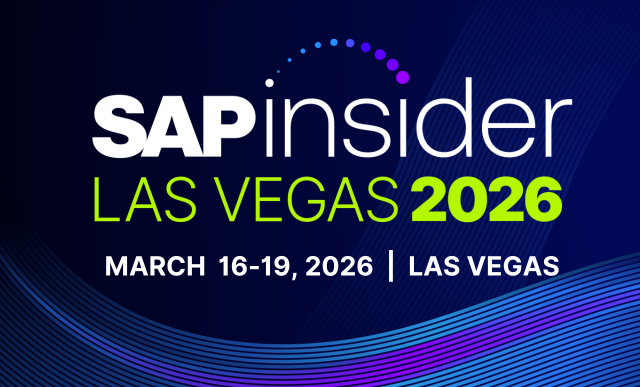The Never-Ending Opportunities with SAP Projects
Every SAP project brings with it tremendous opportunities as well as challenges, not only for your organization at large, but especially for you as a member of the SAP project team. As I look back at my 40+ years of experience, both as a leader within a large global corporation as well as President and owner of my own consulting company, I appreciate the significance that SAP projects have played in my career. The opportunities for professional growth are literally waiting for you to grab. You will come to appreciate how critical communication and change management knowledge and skills are for SAP success. You will gain sensitivity for the importance of developing and supporting competent and skilled end users. You will understand that incorporating continuous improvement into your SAP projects is vital for long-term success. Most exciting, as a member of an SAP team, you become a part of developing a robust and relevant organization through the cultural impacts driven by every SAP project.
In my 25 years of experience working with SAP implementations, the most exciting part of these projects for me was the tremendous opportunities available to impact the very culture of organizations. Organizational culture is the values (spoken and unspoken) of your organization, the way your workplace operates, and what it’s like to work there. It’s the very fabric of your organization and ultimately, determines your organization’s success. SAP projects can profoundly impact how your employees interact with technology, systems, and people, not only with other employees but with your customers and suppliers. Given the magnitude of change that accompanies SAP projects, I believe it’s imperative that SAP project team members understand how to lead effective and impactful cultural transitions. This means that every member of a SAP project team needs to be a better communicator. Every team member needs to understand the impact that change will have, both on you as well as your end users and customers. In the opening spotlight session at Managing Your SAP Projects 2017: “Reaching the new normal: How to achieve lasting cultural change driven by your SAP project,” I am excited to share with you my experiences and ideas on the tremendous business transformation opportunities that are part of every SAP project.
Regardless of how long SAP has been part of your organization’s business solutions, a key challenge for many teams is managing the ongoing end-user support. Whether you have completed a new implementation, an upgrade, new functionality, or new processes, a true measure of a successful SAP project is the degree to which the end users are effectively and efficiently utilizing what you’ve just put in place. Even the most proficient end user will need assistance at some point. And then there are the new employees in your organization who need to be brought up to speed. Super User programs, a systematic and structured approach to communicate with, train, and support your users on an ongoing basis, are one answer to these challenges. Many organizations have attempted to build Super Users programs. Some have struggled with where to begin. For others, an approach was started but eventually “disappeared” because they lacked a strategy for remaining alive and relevant. My pre-conference workshop at Managing Your SAP Projects 2017, “Building and maintaining a successful super user program: How to go live, thrive, and survive,” will provide you with a roadmap of 11 critical areas, that when addressed, can increase the success of any Super User program, regardless of whether you are just beginning to examine this idea or if you already have something in place and you recognize the need to update and improve it. I will share with you models, examples, guidelines, and templates that I have used to implement successful programs, both as a practitioner as well as a consultant. This will include how to get started, stakeholder identification and engagement strategies, needs assessment, program strategy design, sponsorship, role definition, branding and marketing, compensation and recognition, program maintenance, and measurement.
Explore related questions
If you feel that you are on a never-ending treadmill of activity with your SAP projects, you are certainly not alone! Because SAP is such a vital part of how your organization runs its business, and because your business must continually change to meet the needs of its customers and to stay ahead of the competition, there is never really an “end” to SAP. So how do you ensure that your project team is learning from its previous experiences, both successes and failures, so that you can build those lessons learned into the strategies for your new projects? My session, “Conducting a post-mortem evaluation: Project review tools, tips, and templates that support your SAP continuous improvement strategy” at Managing Your SAP Projects 2017 will provide you with specific tools, templates, and guidelines for conducting effective project evaluations that incorporate both quantitative and qualitative methods. We will discuss which stakeholders to include in the feedback process, ways to increase their participation, and ideas for gaining concrete, useful information. I will share with you tips and hints on how to facilitate the data collection and feedback process, guidelines for following up with participants who have provided input, and ideas for prioritizing and sharing the feedback data to ensure you carry through with the most important recommendations. You don’t have to, and probably shouldn’t, wait until your project is completely finished to examine how your team and project are doing. There are ways to conduct quick, even spontaneous, reviews while your project is still in progress that will enable you to fine-tune your project as it progresses.
While the main reason for using SAP in your business strategies is to ensure ongoing, long-term success of your business, there is also the opportunity for professional growth of the SAP team members. If you are one of those individuals who was “pulled” from your team and asked to begin providing leadership and direction for your colleagues, you have no doubt experienced both the joys and challenges of what leadership entails. You may be one of those members of the team who aspires to the role of formal leadership and are working hard to attain that goal. For all who enter the role of leadership, the transition from being one of the team to suddenly having to manage those individuals can be a daunting and humbling experience. Communication breakdowns, changes in relationships, overt and covert criticism, resistance, and even resentment are frequent obstacles that will challenge your patience, your motivation, and your effectiveness. In my session “Move from ‘team colleague’ to ‘team leader’: Simple ways to ensure a successful transition for you (and everyone else),” I will guide you through some of the techniques I used when offering business coaching services in my company and from my own 20-year leadership journey working for a global company. We will examine how to build a team-generated charter and ground rules that establish how you and your team will work effectively together. Soliciting ongoing input and feedback from your team members is critical for ensuring ongoing positive and productive communication. I’ll show you simple and effective tools to enable team feedback. I will also share with you effective coaching techniques that help you not only through your leadership transition, but that sustain productive and harmonious relationships throughout the life of your project and your team. Whether you are already a team “leader” and are seeking ways to improve your skills or if you have “leadership” as one of your career goals, this session is designed to not only increase your skillsets, but more importantly, to increase your self-confidence as a strong, positive leader.
I look forward to meeting you in person at this year’s Managing Your SAP Projects conference taking place November 29 – December 1 in Las Vegas as well as 24-26 October in Copenhagen.
Because I am a speaker for the event, I can provide you with a special discount off the registration price. If you wish to take advantage of this, register through this link: www.sapprojects2017.com/DougWhittle.







